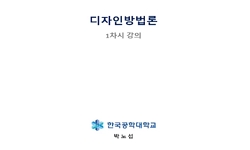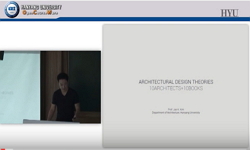Design management for competitiveness starts from recognizing the importance of design management by CEO and is expected to completed when the design methodology was applied to work by designers, marketers, and R&D personnel. This paper studies the de...
http://chineseinput.net/에서 pinyin(병음)방식으로 중국어를 변환할 수 있습니다.
변환된 중국어를 복사하여 사용하시면 됩니다.
- 中文 을 입력하시려면 zhongwen을 입력하시고 space를누르시면됩니다.
- 北京 을 입력하시려면 beijing을 입력하시고 space를 누르시면 됩니다.

사업기회발굴과 혁신수단으로서 디자인 방법론에 관한 연구 - 글로벌 기업과 글로벌 디자인 컨설팅회사의 사례를 중심으로 - = The Development of Design Methodology as a Tool for Developing Business Opportunity and Realizing Innovation - Case Study of Global Company and Global Design Agency -
한글로보기부가정보
다국어 초록 (Multilingual Abstract)
Design management for competitiveness starts from recognizing the importance of design management by CEO and is expected to completed when the design methodology was applied to work by designers, marketers, and R&D personnel. This paper studies the design methodology as a tool for managing design project focusing on the cases of global companies. Before starting the case study of the design methodology, a theoretical study on the existing design methodologies was conducted. Through this, we suggest that each case study should be methodology based on process and evaluated as comprehensive guidelines and a tool. It offers real cases dealing with observation method, creative workshop, synthesis process based on IDEO’s design thinking framework. Observation is a tool for exploring consumer needs hidden with integrated ethnography method. In addition, the creative workshop is a participation tool for cooperation with designer and non designer. Lastly, synthesis is introduced as a convergent tool integrating consumer voice, technology and market trend. These methodologies present a practical guideline for companies to develop business opportunity and realize innovation. Design centric innovation can be embodied through cooperation with designers and non-designers, and integration including consumer based insight, market trend, and technical considerations.
국문 초록 (Abstract)
기업의 경쟁력 제고를 위한 디자인 경영은 최고 경영자가 디자인의 중요성을 인지하면서 시작되며 디자이너, 마케터, R&D인력 모두가 디자인 방법론을 익히고 업무에 적용함으로써 완성된다...
기업의 경쟁력 제고를 위한 디자인 경영은 최고 경영자가 디자인의 중요성을 인지하면서 시작되며 디자이너, 마케터, R&D인력 모두가 디자인 방법론을 익히고 업무에 적용함으로써 완성된다. 이에 본 연구는 조직구성원 들이 학습을 통해서 각자의 업무에 적용할 수 있는 디자인 프로젝트관리를 위한 디자인 방법론을 선진 글로벌 기업의 사례를 중심으로 제시하였다. 디자인 방법론의 사례연구를 시작하기 전에 기존 디자인 방법론에 관한 이론적 고찰을 통해서 각각의 방법론들은 프로세스에 입각해서 종합적인 가이드라인과 도구로서 평가 받을 수 있는 수준의 방법론이어야 함을 제시하였다. 그리고 IDEO의 디자인 사고의 강조점을 통해서 디자인 방법론의 수단으로서 관찰, 창의적 워크숍, 인사이트 통합(synthesis)을 사용하는 기업의 사례를 연구 대상으로 하였다. 관찰은 에쓰노그라피의 종합적 실행을 통하여 숨겨져 있는 소비자의 니즈를 탐구하는 방법론으로서, 창의적 워크숍 기법은 협업을 통한 비디자이너의 디자인 프로세스의 참여의 방법을 제시하는 방법론으로서 제시되었다. 마지막으로 통합의 방법은 고객의 목소리와 기술, 시장의 트렌드를 종합하는 융합적 방법론으로 소개되었다. 기업들은 각각의 디자인 중심의 방법론들을 새로운 비즈니스 기회 발굴과 혁신을 위한 가이드라인과 실용적 수단으로 사용할 수 있을 것이다. 또한 이 연구는 디자인 중심의 이노베이션은 디자이너와 비디자이너와 협업을 통하여, 그리고 고객 중심의 인사이트에 시장 트렌드와 기술에 대한 고려가 더해져 구현됨을 제시하였다.
참고문헌 (Reference)
1 이건표, "제품의 진화와 디자인 방법론의 변화" 2002
2 정봉금, "인터랙션 디자인 연구를 위한 디자인 방법의 응용: 디지털-자아에 아이덴티티 부여하기" 한국디자인학회 21 (21): 209-222, 2008
3 차경은, "에쓰노그라피 방법론(Ethnography Methodology)을 이용한 디자인 리서치 프레임웍 제안" 2005
4 김경희, "소비자중심의 마케팅과 디자인패러다임 변화요인 분석을 통한 디자인방법론 연구" 한국디지털디자인학회 7 (7): 283-293, 2007
5 서정호, "소비가치구조와 기업환경 변화에서의 플랫폼 디자인 전략에 관한 연구 -디자인적 사고 플랫폼 전략-" 한국디자인지식학회 (23) : 201-212, 2012
6 최영현, "서비스디자인 방법론을 활용한 통합브랜드 전략개발 사례연구 - 국립아시아문화전당 통합브랜드전략개발을 중심으로 -" 한국디지털디자인학회 12 (12): 567-578, 2012
7 이용재, "서비스 디자인 프로세스를 적용한 국내 공공 서비스 디자인 비즈니스 모델 개발" 한국디지털디자인학회 11 (11): 549-559, 2011
8 홍누리, "서비스 디자인 프로세스 모델 연구 - 브레인스토밍(Brainstorming)과 스캠퍼(SCAMPER)를 중심으로 -" 한국디지털디자인학회 12 (12): 275-284, 2012
9 정경원, "디자인경영의 학문적ㆍ실무적 맥락" 2006
10 황규영, "디자인경영을 통한 전략적 가치 창출 사례연구 -수직축 풍력발전기의 디자인 개선 사례를 중심으로 -" 한국기업경영학회 15 (15): 1-16, 2008
1 이건표, "제품의 진화와 디자인 방법론의 변화" 2002
2 정봉금, "인터랙션 디자인 연구를 위한 디자인 방법의 응용: 디지털-자아에 아이덴티티 부여하기" 한국디자인학회 21 (21): 209-222, 2008
3 차경은, "에쓰노그라피 방법론(Ethnography Methodology)을 이용한 디자인 리서치 프레임웍 제안" 2005
4 김경희, "소비자중심의 마케팅과 디자인패러다임 변화요인 분석을 통한 디자인방법론 연구" 한국디지털디자인학회 7 (7): 283-293, 2007
5 서정호, "소비가치구조와 기업환경 변화에서의 플랫폼 디자인 전략에 관한 연구 -디자인적 사고 플랫폼 전략-" 한국디자인지식학회 (23) : 201-212, 2012
6 최영현, "서비스디자인 방법론을 활용한 통합브랜드 전략개발 사례연구 - 국립아시아문화전당 통합브랜드전략개발을 중심으로 -" 한국디지털디자인학회 12 (12): 567-578, 2012
7 이용재, "서비스 디자인 프로세스를 적용한 국내 공공 서비스 디자인 비즈니스 모델 개발" 한국디지털디자인학회 11 (11): 549-559, 2011
8 홍누리, "서비스 디자인 프로세스 모델 연구 - 브레인스토밍(Brainstorming)과 스캠퍼(SCAMPER)를 중심으로 -" 한국디지털디자인학회 12 (12): 275-284, 2012
9 정경원, "디자인경영의 학문적ㆍ실무적 맥락" 2006
10 황규영, "디자인경영을 통한 전략적 가치 창출 사례연구 -수직축 풍력발전기의 디자인 개선 사례를 중심으로 -" 한국기업경영학회 15 (15): 1-16, 2008
11 김유진, "디자인 경영 연구의 변화 추이 분석" 2006
12 이경아, "감성-경험 기반의 서비스디자인 프로세스에 대한 연구" 한국디지털디자인학회 13 (13): 415-426, 2013
13 Laurenceau JP, "Using diary methods to study marital and family processes" 19 : 2005
14 Shane, S., "The Promise of Entrepreneurship as a Field of Research" 25 (25): 2000
15 Abe, T., "Teaching the Writing and Role of Specifications Via a Structured Teardown Process" 24 (24): 2003
16 Gorb, Peter, "Silent Design" 8 (8): 1987
17 Wechsler, Jacqueline, "Reflections on Service Design, Frameworks, and the Service Organization" 23 (23): 2012
18 Clark, Brian, "Rapid Ideation in Action: Getting Good Ideas Quickly and Cheaply" 9 (9): 1998
19 Roozenburg, N. F. M., "Product Design Fundamentals and Methods" John Willy & Sons 1995
20 Miaskiewicz, T., "Personas and User-Centered Design: How Can Personas Benefit Product Design Processes" 32 (32): 2011
21 Vermaas, P. E., "On the Conceptual Framework of John Gero's Fbs-Model and the Prescriptive Aims of Design Methodology" 28 (28): 2007
22 Suzuki H, "Measuring information behavior: A time budget survey in Japan" 42 : 1997
23 빌, 모그리지, "Ideo와 스탠포드 대학의 “혁신을 통한 디자인” 육성" 2008
24 Cain, John., "Experience-Based Design: Toward a Science of Artful Business Innovation" 9 (9): 1998
25 Stropkay, Scott, "Embracing Complexity: A Framework for Healthcare Design" 23 (23): 2012
26 Humphreys, T., "Embedding Expert Users in the Interaction Design Process: A Case Study" 29 (29): 2008
27 Beverland, Michael B., "Designers and Marketers: Toward a Shared Understanding" 22 (22): 2011
28 Verganti, Roberto, "Design, Meanings, and Radical Innovation; A Meta model and a Research Agenda" 25 (25): 2008
29 Archer, B., "Design as a Discipline" 1 (1): 1979
30 Houkes, W., "Design and Use as Plans: An Action-Theoretical Account" 23 (23): 2002
31 Hubka, V., "Design Tactics = Methods + Working Principles for Design Engineers" 4 (4): 1983
32 Kroes, Peter, "Design Methodology and the Nature of Technical Artefacts" 23 (23): 2002
33 Petersen, Søren Ingomar, "Design Insights from User Research and Crowdsourcing" 23 (23): 2012
34 Salvador, Tony, "Design Ethnography" 10 (10): 1999
35 Jenkins, Julian, "Creating the Right Environment for Design" 19 (19): 2008
36 Yin, R.K, "Case Study Research, Design and Methods" Sage Publications 1984
37 Mayfield, Matt, "Battling the Demons of Complexity: Design Thinking in a Business Context" 23 (23): 2012
38 Coates, Del., "Analyzing and Optimizing Discretionary Information" 8 (8): 1997
동일학술지(권/호) 다른 논문
-
- 한국디지털디자인학회
- 김지연
- 2013
- KCI등재
-
미디어 환경 변화에 따른 플렉서블 아이덴티티에 관한 연구
- 한국디지털디자인학회
- 김찬숙
- 2013
- KCI등재
-
박물관에서 증강현실(Augmented Reality) 매체를 통한 메시지 전달의 효율성에 관한 연구
- 한국디지털디자인학회
- 오선애
- 2013
- KCI등재
-
- 한국디지털디자인학회
- 김종무
- 2013
- KCI등재
분석정보
인용정보 인용지수 설명보기
학술지 이력
| 연월일 | 이력구분 | 이력상세 | 등재구분 |
|---|---|---|---|
| 2018 | 평가예정 | 신규평가 신청대상 (신규평가) | |
| 2017-12-01 | 평가 | 등재후보 탈락 (계속평가) | |
| 2016-01-01 | 평가 | 등재후보학술지 유지 (계속평가) |  |
| 2015-12-01 | 평가 | 등재후보로 하락 (기타) |  |
| 2014-12-29 | 학회명변경 | 영문명 : 미등록 -> Korea Digital Design Society |  |
| 2011-01-01 | 평가 | 등재학술지 유지 (등재유지) |  |
| 2008-01-01 | 평가 | 등재학술지 선정 (등재후보2차) |  |
| 2007-01-01 | 평가 | 등재후보 1차 PASS (등재후보1차) |  |
| 2006-01-01 | 평가 | 등재후보학술지 유지 (등재후보1차) |  |
| 2004-07-01 | 평가 | 등재후보학술지 선정 (신규평가) |  |
학술지 인용정보
| 기준연도 | WOS-KCI 통합IF(2년) | KCIF(2년) | KCIF(3년) |
|---|---|---|---|
| 2016 | 0.53 | 0.53 | 0.5 |
| KCIF(4년) | KCIF(5년) | 중심성지수(3년) | 즉시성지수 |
| 0.49 | 0.48 | 0.814 | 0.11 |




 KCI
KCI






